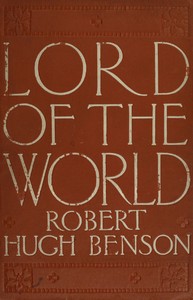| Summary |
"Lord of the World" by Robert Hugh Benson is a dystopian novel written in the early 20th century. The book explores a future where traditional religious beliefs are in decline, and materialism and social upheaval dominate society, particularly focusing on the rise of Communism and Humanitarianism. The story introduces characters like Oliver Brand and Father Percy Franklin, who navigate this tumultuous world while grappling with the existential threat posed by the Eastern Empire and the enigmatic figure Felsenburgh. The opening of "Lord of the World" sets up a complex narrative that establishes this future society marked by technological advancement and the erosion of faith. We are introduced to Father Percy and Father Francis as they discuss the socio-political landscape of their time, reflecting on how religion has faded and Communism has surged in the absence of traditional authority. The scene shifts to Oliver Brand, a politician who is deeply concerned about the looming threat from the East and the rise of a powerful new leader, Felsenburgh. As tensions escalate, questions about the nature of belief and the fate of humanity filter through the interactions of the characters, laying the groundwork for the ideological conflicts that will unfold throughout the novel. (This is an automatically generated summary.)
|

